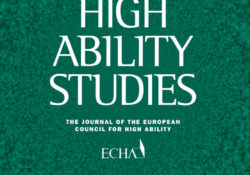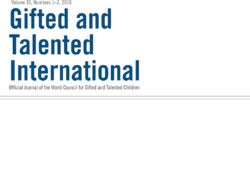eric.ed.gov har udgivet: This study examines the problem of underachievement among gifted high school students. Low achievers were compared to high and moderate achievers on their motivation, self-regulation, and attitudes toward their school and teachers. Participants were all highly able students from grades 10 and 11 in an academically selective gifted high school in Australia (n=197). Teachers were asked to rank the students into high, moderate, and low achievers in terms of their performance in two subjects English and Mathematics. Participants were asked to respond to two surveys that measured their personality characteristics. The results indicate that math achievement and not language achievement may be used with confidence to classify gifted students; high achiever had higher mean scores than moderate and low achievers on all study variables; intrinsic motivation then… Continue Reading →
Like this:
Like Loading...
tandfonline.com har udgivet en rapport under søgningen “Teacher Education Mathematics”: Link til kilde
Like this:
Like Loading...
tandfonline.com har udgivet en rapport under søgningen “Teacher Education Mathematics”: ABSTRACT ABSTRACT This paper describes an Israeli national-level research examining the extent to which admissions of elementary school students to the gifted programmes based on standardised tests are gender-fair. In the research, the gifted students consisted of 275 boys, 128 girls, and additional 80 girls who were admitted to the gifted programme through affirmative action (AA). To assess these young students’ scientific thinking skills, also referred to as science practices, open-ended questions of case-based questionnaires were developed. The investigated scientific thinking skills were question posing, explanation, graphing, inquiry, and metacognition. Analysis of the students’ responses revealed that gifted girls who entered the programmes through AA performed at the same level as the other gifted students. We found significant differences between… Continue Reading →
Like this:
Like Loading...

tandfonline.com har udgivet en rapport under søgningen “Teacher Education Mathematics”: ABSTRACT ABSTRACT Enrichment programs provide learning opportunities for a broader or deeper examination of curricular or extracurricular topics and are popular in gifted education. Herein, we investigated the effectiveness of a statewide extracurricular enrichment program for gifted elementary school children in Germany. The program implemented a ”grass roots“ strategy by which local units developed and offered the enrichment courses, which spanned a broad array of topics. The courses targeted different outcomes, including students’ cognitive abilities, school achievement, interests, creativity, self-control, self-concept, and social competencies. We compared third-grade students attending the enrichment program (N =423) with nonattending third-grade students (N = 2,328) by means of a propensity score analysis. Specifically, we controlled for potential selection effects and estimated the average causal… Continue Reading →
Like this:
Like Loading...

tandfonline.com har udgivet en rapport under søgningen “Teacher Education Mathematics”: Abstract Abstract There are two competing stereotypes of gifted students: harmony theory (gifted students are well adjusted and successful in life) and disharmony theory (giftedness forms a threat to a harmonious development). In this context, the PISA 2012 data were used to explore middle-school students’ experiences in terms of sense of belonging, student–teacher relations and attitudes toward school concerning learning activities/outcomes. Fifteen-year-old students from 13 European countries were selected for this data-set (normative = 79,550, gifted = 1956). Student’s scores on the four scales were tested for significant differences with students from that same country. Tests revealed no significant differences for 55% of the comparisons, 40% of comparisons had positive effect sizes for gifted students, and 4% had negative effect sizes. The evidence presented… Continue Reading →
Like this:
Like Loading...
tandfonline.com har udgivet en rapport under søgningen “Teacher Education Mathematics”: Abstract Abstract The purpose of this paper is to provide an overview of gifted education in Brazil. A scenario of the education of the gifted is presented, including the official concept of giftedness as well as programs and services available to emphasize important contributions to the area. Although there are considerable advances regarding policies, practices, and research on giftedness, the country faces many challenges regarding the waste of talent and the quality of public education. Thus, there are difficult issues that must be addressed to promote the education gifted children and the development of high abilities in Brazil. Relevant research findings have emerged during the past 10 years indicating problems and possibilities to consider. The proposals for future directions with… Continue Reading →
Like this:
Like Loading...
tandfonline.com har udgivet en rapport under søgningen “Teacher Education Mathematics”: Abstract Abstract The aim of this paper is to reveal the current situation of gifted education in Turkey. The talents that are valued and the concepts of giftedness were discussed according to the country’s cultural and political perspectives. Studies that had been made to analyze the beliefs of lay people, teachers and parents with respect to gifted students and their education were mentioned. Programs such as special schools (science high schools, private school programs), resource rooms and after-school programs (Science and Art Centers [SACs], Education Programs for Talented Students [EPTS], child universities) were introduced. How these programs currently function was also discussed. In addition, it has emerged that the studies carried out in the past 10 years focused on the… Continue Reading →
Like this:
Like Loading...
tandfonline.com har udgivet en rapport under søgningen “Teacher Education Mathematics”: Abstract Abstract Multiple recent reviews have compared and contrasted the Russian (post-Soviet) system of identifying and educating gifted and talented students with other systems in the world. Correspondingly, this essay only briefly outlines the main features of this system in Russia and focuses primarily on the questions identified as key by the editors of this special issue. It provides a demographic–economic, educational, and historical consideration of the system, presents its essential features, comments on the system’s contribution to international science and the practice of identifying and nurturing gifted and talented students, and outlines the system’s points of future possible growth. Link til kilde
Like this:
Like Loading...
eric.ed.gov har udgivet: The purpose of this action research project report was to increase student motivation and engagement. There seemed to be an increasing disconnect between student potential and performance, especially among gifted math and beginning music students. Two teacher researchers carried out this research with 25 fifth-grade students at two different sites in a gifted math class and a beginning band class. The research was conducted from September 11th, 2012, through December 17th, 2012. In order to document the lack of student motivation and engagement, three tools were utilized; a teacher survey, a student survey, and a student behavior checklist. After analyzing the collected data, it was evident that a notable percentage of students felt that their school work was too easy while teachers felt their lessons were appropriately… Continue Reading →
Like this:
Like Loading...
tandfonline.com har udgivet en rapport under søgningen “Teacher Education Mathematics”: ABSTRACT ABSTRACT Mathematically gifted and talented students have unique cognitive and emotional needs. Thus, their schooling should consider their social and emotional development. This study investigated student affect in a science high school in Korea to determine how the specialized school’s curriculum and instruction influence student affect. Data were collected through interviews and a survey. Our findings show that gifted and talented students generally demonstrate a positive affect toward mathematics, but high anxiety and low self-concept play a key role in shaping students’ negative attitudes toward mathematics. In this paper, we argue that two different goals – gifted education and college preparation – could cause such negative student affect. The dual educational goal manifests itself in fast-paced instruction and memorized… Continue Reading →
Like this:
Like Loading...







